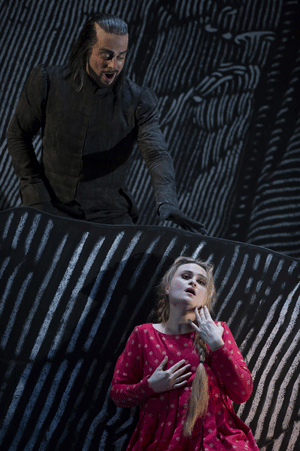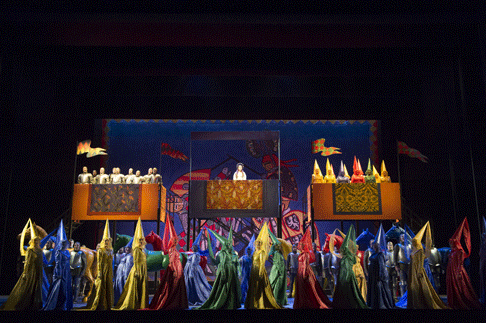Recently in Performances
English Touring Opera are delighted to announce a season of lyric monodramas to tour nationally from October to December. The season features music for solo singer and piano by Argento, Britten, Tippett and Shostakovich with a bold and inventive approach to making opera during social distancing.
This tenth of ten Live from London concerts was in fact a recorded live performance from California. It was no less enjoyable for that, and it was also uplifting to learn that this wasn’t in fact the ‘last’ LfL event that we will be able to enjoy, courtesy of VOCES8 and their fellow vocal ensembles (more below …).
Ever since Wigmore Hall announced their superb series of autumn concerts, all streamed live and available free of charge, I’d been looking forward to this song recital by Ian Bostridge and Imogen Cooper.
Although Stile Antico’s programme article for their Live from London recital introduced their selection from the many treasures of the English Renaissance in the context of the theological debates and upheavals of the Tudor and Elizabethan years, their performance was more evocative of private chamber music than of public liturgy.
Evidently, face masks don’t stifle appreciative “Bravo!”s. And, reducing audience numbers doesn’t lower the volume of such acclamations. For, the audience at Wigmore Hall gave soprano Elizabeth Llewellyn and pianist Simon Lepper a greatly deserved warm reception and hearty response following this lunchtime recital of late-Romantic song.
For this week’s Live from London vocal recital we moved from the home of VOCES8, St Anne and St Agnes in the City of London, to Kings Place, where The Sixteen - who have been associate artists at the venue for some time - presented a programme of music and words bound together by the theme of ‘reflection’.
'Such is your divine Disposation that both you excellently understand, and royally entertaine the Exercise of Musicke.’
‘And there was war in heaven: Michael and his angels fought against the dragon; and the dragon fought and his angels, And prevailed not; neither was their place found any more in heaven … that old serpent … Satan, which deceiveth the whole world: he was cast out into the earth, and his angels were cast out with him.’
There was never any doubt that the fifth of the twelve Met Stars Live in Concert broadcasts was going to be a palpably intense and vivid event, as well as a musically stunning and theatrically enervating experience.
‘Love’ was the theme for this Live from London performance by Apollo5. Given the complexity and diversity of that human emotion, and Apollo5’s reputation for versatility and diverse repertoire, ranging from Renaissance choral music to jazz, from contemporary classical works to popular song, it was no surprise that their programme spanned 500 years and several musical styles.
The Academy of St Martin in the Fields have titled their autumn series of eight concerts - which are taking place at 5pm and 7.30pm on two Saturdays each month at their home venue in Trafalgar Square, and being filmed for streaming the following Thursday - ‘re:connect’.
The London Symphony Orchestra opened their Autumn 2020 season with a homage to Oliver Knussen, who died at the age of 66 in July 2018. The programme traced a national musical lineage through the twentieth century, from Britten to Knussen, on to Mark-Anthony Turnage, and entwining the LSO and Rattle too.
With the Live from London digital vocal festival entering the second half of the series, the festival’s host, VOCES8, returned to their home at St Annes and St Agnes in the City of London to present a sequence of ‘Choral Dances’ - vocal music inspired by dance, embracing diverse genres from the Renaissance madrigal to swing jazz.
Just a few unison string wriggles from the opening of Mozart’s overture to Le nozze di Figaro are enough to make any opera-lover perch on the edge of their seat, in excited anticipation of the drama in music to come, so there could be no other curtain-raiser for this Gala Concert at the Royal Opera House, the latest instalment from ‘their House’ to ‘our houses’.
"Before the ending of the day, creator of all things, we pray that, with your accustomed mercy, you may watch over us."
The doors at The Metropolitan Opera will not open to live audiences until 2021 at the earliest, and the likelihood of normal operatic life resuming in cities around the world looks but a distant dream at present. But, while we may not be invited from our homes into the opera house for some time yet, with its free daily screenings of past productions and its pay-per-view Met Stars Live in Concert series, the Met continues to bring opera into our homes.
Music-making at this year’s Grange Festival Opera may have fallen silent in June and July, but the country house and extensive grounds of The Grange provided an ideal setting for a weekend of twelve specially conceived ‘promenade’ performances encompassing music and dance.
There’s a “slide of harmony” and “all the bones leave your body at that moment and you collapse to the floor, it’s so extraordinary.”
“Music for a while, shall all your cares beguile.”
The hum of bees rising from myriad scented blooms; gentle strains of birdsong; the cheerful chatter of picnickers beside a still lake; decorous thwacks of leather on willow; song and music floating through the warm evening air.
Performances
![Patrizia Ciofi as Isabelle and Bryan Hymel as Robert [Photo by Bill Cooper courtesy of the Royal Opera House]](http://www.operatoday.com/RobertLeDiable_109a.gif)
23 Dec 2012
Subject: Aimez-vous Meyerbeer?
Well, so many don’t nowadays, it appears to me, judging by the critical
reception of Robert le Diable at the ROH. Rum-ti-tum? We recall
Macbeth, Rigoletto, Trov and even Trav being characterised
thus, popular fare but risible or blush- making, yet those works now command
the highest respect.
True, Meyerbeer lacks the high melodic genius of Verdi,
whose every work is both obviously his yet paradoxically also has its own
unique sound world; but I think the problem is not that. We are out of sympathy
with the social world for which such works were conceived.
 Marina Poplavskaya as Alice and John Relyea as Bertram
Marina Poplavskaya as Alice and John Relyea as Bertram
Long, leisurely five-acters? Plots elevated to the level of the hieratic?
Above all comfortable plushness, with little apparent intellectual bite? All
that suited opera audiences of the time, but something more is needed for
survival, and you don’t have to listen very hard to discern it. Skill in the
construction of a theatre piece, to start with: how different do the two long
scenes between Bertram/Raimbaut and Bertram/Alice sound, for instance,
reflecting Bertram’s manipulation of each of these victims and their
differing reactions (no pushover, she); how each character is delineated
through the music, their unfolding scenas certainly not generic as is
the libretto; how atmospheric are the orchestral passages, even though perhaps
some might long for Weber.
All this would go for naught, of course, without a fine performance. Do you
ever have that feeling, when the lights dim and the first notes arise, that all
will be well this evening, and there is nowhere else you would rather be? It
was that way on Saturday last, softly bathed in pellucid sound (Daniel Oren
conducting) perfectly judged for the auditorium, without that muddiness that
often tells you you’re in for a sticky ride; above all the singers had the
measure of the style: to my ear French display opera has a certain chic
restraint, without the glitz of its Italian counterpart, and whilst Damrau
would have been starrier, Ciofi (yes, an Italian) was most touching, every
cadence perfectly placed. Poplavskaya excelled herself, with an unusual
combination of staunchness and thrilling ease; Hymel paid Meyerbeer the
compliment of taking him seriously, and was utterly believable in the role,
which he made seem child’s play to sing; Relyea has been seriously
undervalued, and Jean-Francois Borras was a delightful new discovery for me.
And the Chorus excelled themselves.
 A scene from Robert le Diable
A scene from Robert le Diable
Which brings me to Laurent Pelly’s production. When it comes to the
chorus, modern directors seem to model themselves on Eisenstein. Here there is
a difference: Pelly’s chorus is sometimes Greek, hovering en masse, but
always in articulated geometrical forms — think Pina Bausch dance, where we
see individuals impelled however to move in unison. So in Act 1 we see the
knights tightly choreographed but moving like lava when the occasion demands;
later they assume a diamond formation, as if grouped in a giant boardgame.
Sounds odd, maybe, but it has the effect of throwing the main characters into
individual relief, and aiding the flow of the plot.
The nuns’ music surprised me (I must have been confusing them with
Casanova’s); it is hard to guess what the original movement must
have been, but the costumes were closely modelled on lithographs of that time,
the music perhaps self-indulgently long and unvaried, the dancers nicely
distinguished even if all in the same plight. Only ten, on this big space? I
thought; but then the whole chorus flooded on, swamping the stage, even more
deshabilles, and equally frantic, in a splendid coup de
théâtre. Costumes might well have been taken from contemporary
miniatures; settings from prints of the time (the stage department excelled
itself in their manipulation).
I came away elated, thinking that the composer had achieved an integrated
piece of work on a high level, with that afterglow you get following a really
good meal. I guess that’s what the original audiences felt too. Will
Meyerbeer catch on? Don’t put money on it. Maybe you have to be a bourgeois
Marxist to like it?!
Kenneth Brown
Click
here for additional production information.
![Patrizia Ciofi as Isabelle and Bryan Hymel as Robert [Photo by Bill Cooper courtesy of the Royal Opera House]](http://www.operatoday.com/RobertLeDiable_109a.gif)

